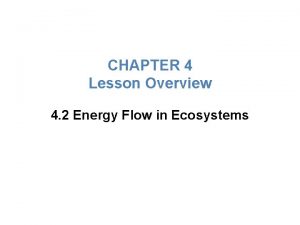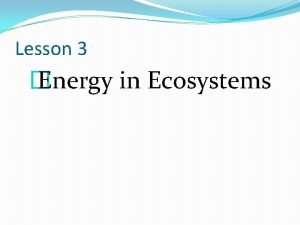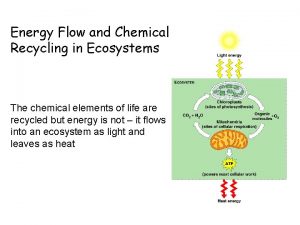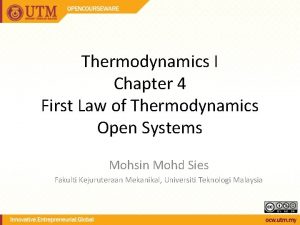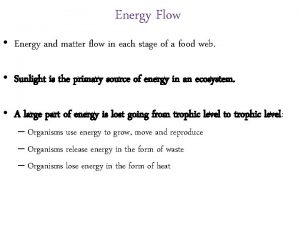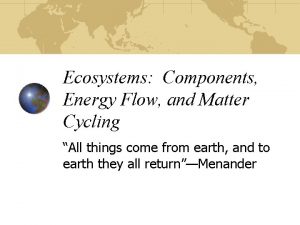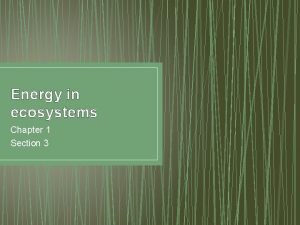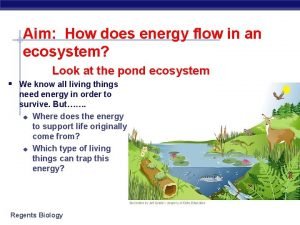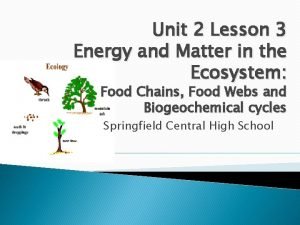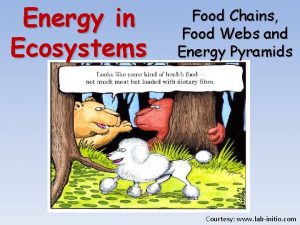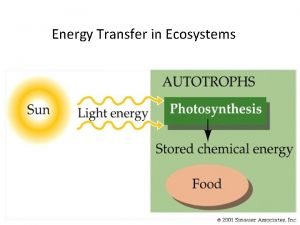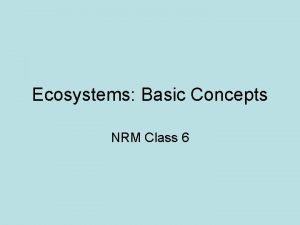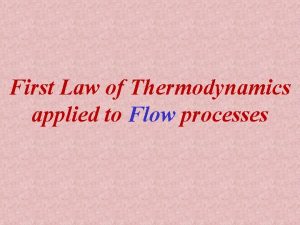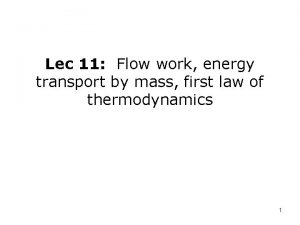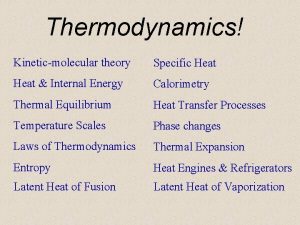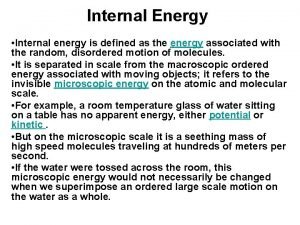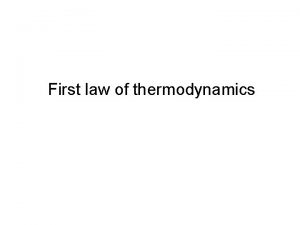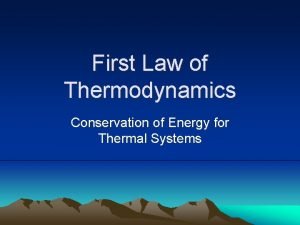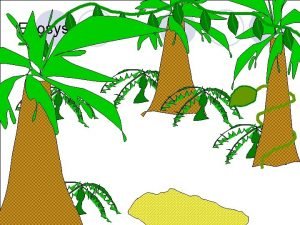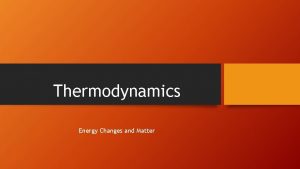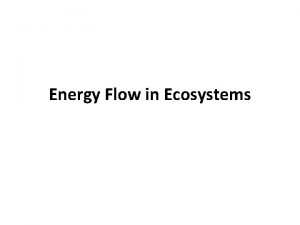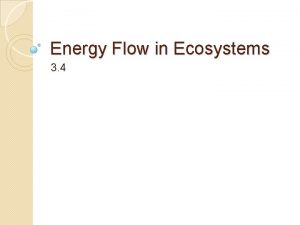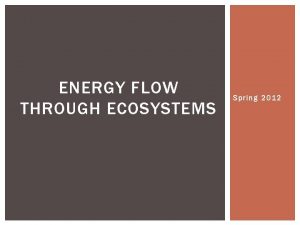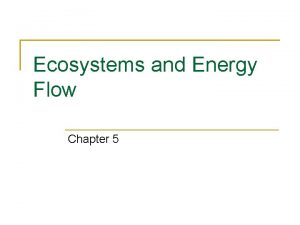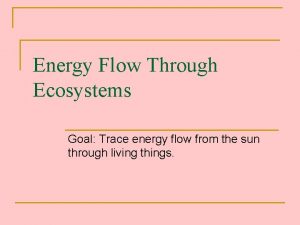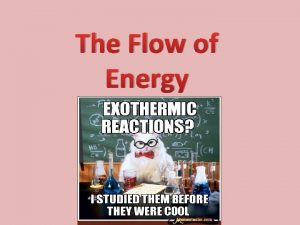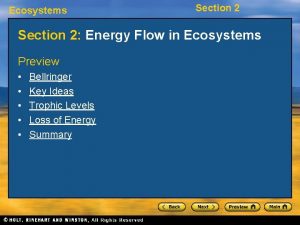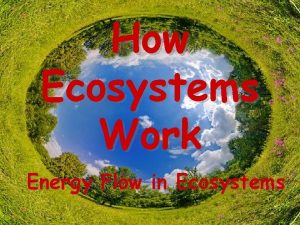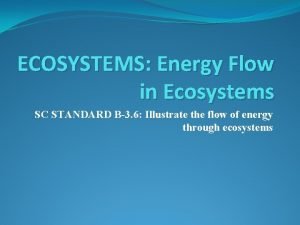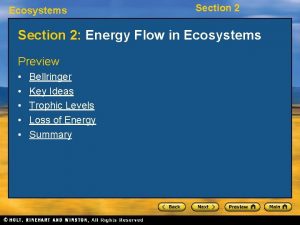Energy Flow in Ecosystems I Thermodynamics A n





















- Slides: 21

Energy Flow in Ecosystems

I. Thermodynamics A. n = the study of energy transfer that occurs in matter = anything that has mass & takes up space

B. The Laws of Thermodynamics 1. First Law of thermodynamics Energy can neither be created nor destroyed. However: It can change form……. . Light ->->Heat

The Laws of Thermodynamics 2. Second Law of thermodynamics Energy transformations lead to an increase in ENTROPY in a system. Entropy = disorder (chaos) n Order ->->-> Disorder n Entropy always increases. n

II. Energy transformations in an ecosystem A. Producers (primary energy sources) Plants are producers. 1. E travels via Ultra-violet light from Sun to plants 2. Plants (by photosynthesis) make own food to store E as glucose (sugar) (E = energy)

II. Energy transformations in an ecosystem B. Consumer = organism that eats plants or other organisms to get E

Energy transformations in an ecosystem C. Detrivore n = breaks dead matter into smaller pieces to help recycle it n E. g. worms, maggots, crabs, millipedes

Energy transformations in an ecosystem D. Decomposer = agent of decay Recycles the nutrients in dead bodies to return them to the ecosystem E. g. bacteria, fungi

Energy transformations in an ecosystem

Energy Flow in an Ecosystem

III. Trophic levels (-troph= feeder) Trophic level = feeding level; levels of an ecosystem that E flows through Energy pyramid

IV. Energy Loss Between Trophic Levels n Only 10% 0 f E moves from one trophic level to the next

∴(therefore) 90% of E is lost to heat for each trophic level we go up

¿Why does it take so many mice to feed one hawk? 90% E lost each trophic level we go up

V. Food Chains Food chain = the path that E takes through the trophic levels

Food Chain Examples

VI. Feeding patterns pattern definition example

VI. Feeding patterns pattern herbovore carnivore omnivore definition example

VI. Feeding patterns pattern definition example herbivore Plant eater Deer, mouse carnivore Meat eater Lion, dog omnivore Eater of plants & animals Bear, pig, human

VI. Feeding patterns pat

VI. Feeding patterns pattern definition example Filter feeder Filters food from water Baleen whales, flamingoes Detrivore Eater of dead organic matter Decomposer Breaks dead matter to the molecular level, returns nutrients to the envt. Maggots, crabs, worms, millipedes Bacteria, fungi
 Chapter 4 lesson 2 energy flow in ecosystems answer key
Chapter 4 lesson 2 energy flow in ecosystems answer key Energy in ecosystems lesson 3 answer key
Energy in ecosystems lesson 3 answer key Flow of energy
Flow of energy Primary consumer definition
Primary consumer definition Section 1 energy flow in ecosystems
Section 1 energy flow in ecosystems First law of thermodynamics for open system
First law of thermodynamics for open system Ecological succession
Ecological succession Oikos meaning
Oikos meaning Section 3 energy in ecosystems
Section 3 energy in ecosystems Chapter 42 ecosystems and energy
Chapter 42 ecosystems and energy How does energy flow in an ecosystem
How does energy flow in an ecosystem Lesson 3 energy and matter in ecosystems answer key
Lesson 3 energy and matter in ecosystems answer key Lab food chains and energy in ecosystems
Lab food chains and energy in ecosystems Do birds eat squirrels
Do birds eat squirrels Energy transfer in ecosystem
Energy transfer in ecosystem Food chain for class 6
Food chain for class 6 Steady flow process thermodynamics
Steady flow process thermodynamics What is flow work in thermodynamics
What is flow work in thermodynamics Internal energy formula thermodynamics
Internal energy formula thermodynamics Internal energy in thermodynamics definition
Internal energy in thermodynamics definition Example of adiabatic process
Example of adiabatic process First law of energy conservation
First law of energy conservation
